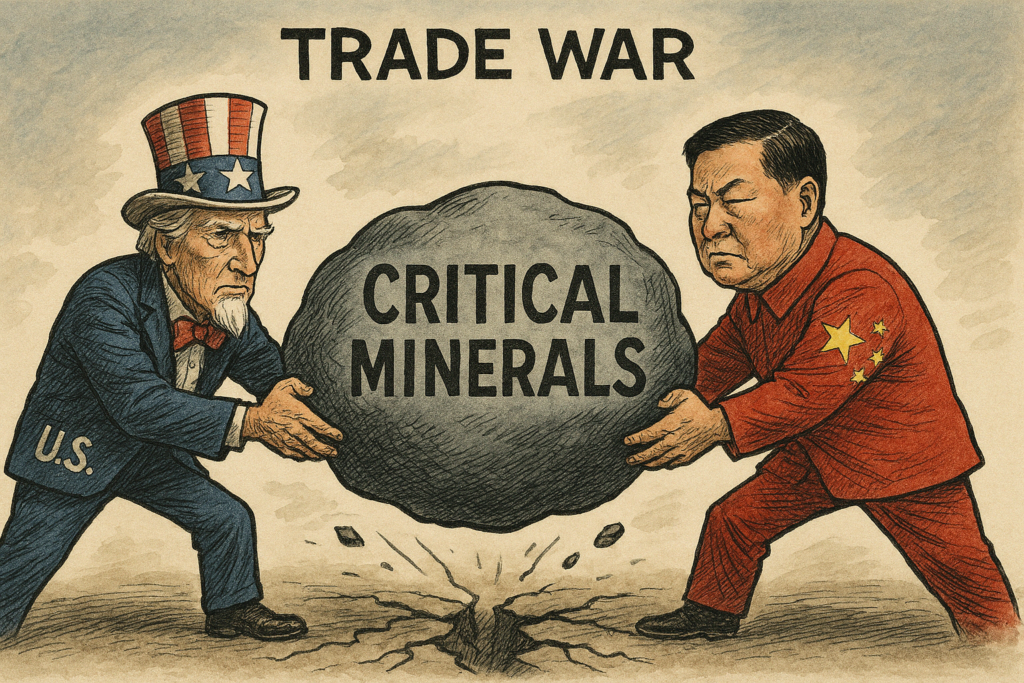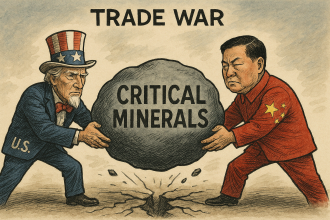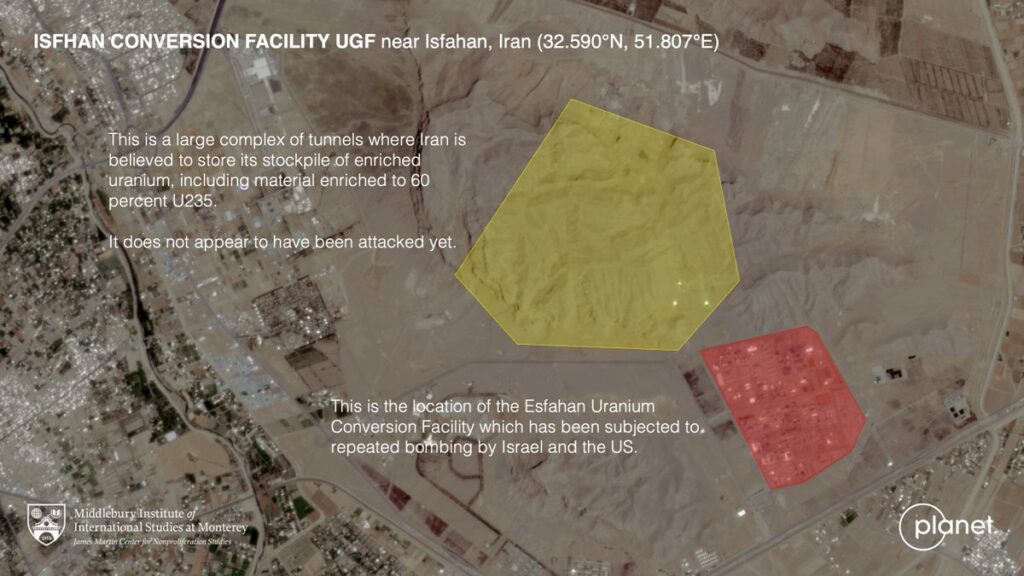“Never hate your enemies. It affects your judgment.”
— The Godfather

According to CSIS, there is a high likelihood that the U.S. government will invoke a national emergency to conserve stockpiles of rare earth minerals—prioritizing the defense industry over the automotive sector in electric vehicle production.
China’s Halt of Critical Minerals
This ties into John Thomas’ latest comment, as well as Trump’s recent hints at potential government support for the U.S. automotive industry.
As we've mentioned before, in recent months it has become increasingly difficult to gauge market expectations using open-source information. This may, in part, be due to different cohorts of influential market participants accessing narrow bands of intelligence.
When it comes to U.S. politics, strong sentiments—whether positive or negative—toward the Trump administration have regularly clouded objective analysis and reasoning. It still baffles us why personal views so often take precedence over true subject matter expertise—despite the track record.
At other times, what we consider to be key new developments may already be old news to those on the front lines. This might be one of those instances.
Here's a brief summary of the CSIS podcast with reference to the October 2023 report by Seth Jones (summoned):
Summary: China's Critical Mineral Export Halt – US Implications (CSIS)
This report summarizes the key findings and discussions from a CSIS podcast featuring Andrew Schwartz (host) andGraceland Bascaran, Director of the Critical Minerals Security Program at CSIS, regarding China's restrictions on critical mineral exports, particularly rare earth elements, and their implications for the United States. The discussion highlights the US's significant reliance on China for both the mining and, critically, the processing of these minerals, which are essential for various sectors including defense, automotive (especially electric vehicles), aerospace, and semiconductors. China's move, initially implemented as “non-automatic licensing,” is seen as a retaliatory measure to US tariffs and poses a significant threat to US national and economic security due to potential disruptions in supply chains and the limited domestic processing capabilities.
Key Themes and Findings
Definition and Importance of Rare Earth Minerals
Rare earth minerals are a group of 17 minerals that are not geologically rare but found in small quantities, requiring large-scale deposits for economic extraction. China holds a dominant position, producing approximately 60% of the world's rare earth and processing around 90% of the global supply. These minerals are crucial for various advanced technologies:
- Defense: Warships (e.g., Arleigh Burke class destroyer contains 5,200 lbs, Virginia class submarine about 9,200 lbs), fighter jets (e.g., F-35 containing 900 lbs), missiles, satellites, and radar systems. Specific critical rare earths mentioned include dysprosium, neodymium, and terbium.
- Automotive: Essential for powerful magnets used in the motors of electric vehicles (EVs).
- Aerospace and Semiconductors: Also heavily reliant on these minerals (Germanium and Gallium mentioned separately as crucial for semiconductors).
China's Export Restrictions and Their Nature
China has implemented “non-automatic licensing” for rare earth exports, requiring companies to apply for permits, giving China control over the supply. These restrictions coincide with a new list of banned firms for doing business with China, including 15 defense and aerospace companies, further limiting access even if export permits are granted. This action is likely in retaliation to US tariffs.
Impact on US Industries
- Defense: The inability to access rare earths will severely inhibit the US's ability to develop and manufacture weapons, especially given that China is reportedly outpacing the US in weapons development and manufacturing by a rate of five to six times. This “deeply inhibits” the US's ability to respond to threats.
- Automotive: The lack of rare earth magnets will significantly disrupt the manufacturing of electric vehicles, as the auto industry generally lacks the stockpiles that some defense companies might have. Defense uses are likely to be prioritized over civilian uses in case of supply disruptions. This could be a “major disruptor of manufacturing particularly electric vehicles” and have “generational consequences” for auto-dependent regions like Michigan.
- Semiconductors: Rare earths are also important for semiconductor production, adding another layer of vulnerability. Gallium and Germanium, crucial for semiconductors, have also faced targeted export restrictions from China. The US doesn't even produce Gallium domestically. There will be “fierce competition for limited supply” given the wide use of rare earths.
Lack of US Domestic Processing Capabilities
Despite some rare earth mining in the US (e.g., MP Materials), the country lacks sufficient domestic capacity for processing and separating these minerals. MP Materials currently stockpiles the rare earth they extract as they lack the separation capabilities in the US. In December 2023, China banned the export of rare earth processing and separation technology, exacerbating the issue as Western countries, including the US and Australia, have lost the technical know-how in this area, meaning progress will be slower. The US didn't “even develop the technical knowhow to be able to do this”.
Historical Context and Lack of Action
China previously weaponized rare earth exports in 2010 during a dispute with Japan, cutting off supplies. Despite awareness of the growing reliance on China and the potential for weaponization, the US has been slow to develop its own comprehensive strategy and build domestic capacity. “Inaction was a course of action we charted for a long time”.
Potential Solutions and Challenges
- The US is now trying to accelerate the development of domestic processing capabilities, with facilities being built in Texas and California. However, these will take time to come online.
- The US is also looking to diversify its sources of rare earth through international collaborations and investments in projects in countries like South Africa (DFC involvement) and Brazil (potential debt financing for Serra Verde).
- The success of these efforts hinges on aligning foreign policy to secure feedstock with domestic industrial strategy for refining.
- Mining is a long-term industry, and building a resilient supply chain cannot happen overnight.
- China's President Xi Jinping's visits to Vietnam and Malaysia, countries with significant rare earth reserves and processing capabilities respectively, are likely strategic moves to further solidify China's control over the supply chain and potentially limit the US's ability to find alternative sources. Vietnam has the second-largest reserves globally, and Malaysia has one of the few separation facilities outside of China.
Economic Pain and Long-Term Consequences
The US is expected to experience “a lot of pain and it's going to be long-term pain” due to these restrictions. Mining companies may seek more stable markets outside the US due to the uncertainty of US trade policies, making it difficult to secure long-term offtakers for the US market. The example of a Canadian Germanium producer shifting its supply to Asia due to US tariffs illustrates this point. Increased costs for goods reliant on these minerals, including semiconductors and EVs, are anticipated.
Potential for Congressional Action
There is significant bipartisan support in Congress to address the issue of critical mineral supply chains and reduce reliance on China. Various bills have been and are likely to be introduced to finance domestic projects, encourage international cooperation, and improve geological mapping of resources. Legislative efforts are expected to prioritize critical minerals, particularly those with high reliance on China and vital for national security (like rare earths and graphite).
Conclusion
China's restrictions on critical mineral exports, particularly rare earths, represent a significant challenge to the United States' national security and economic stability. The US's heavy reliance on China for both mining and processing, coupled with a history of inaction in developing domestic capabilities, has created a vulnerable position. While efforts are underway to build domestic capacity and diversify sources, these are long-term endeavors. The immediate impact will likely be felt across key industries, including defense and automotive. Bipartisan support in Congress suggests potential legislative action to address this critical issue and bolster the US's long-term resilience in the face of a dominant global player in this vital sector.






